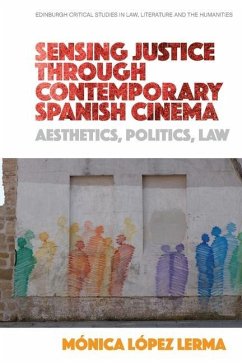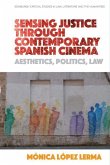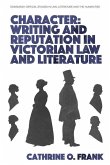- Broschiertes Buch
- Merkliste
- Auf die Merkliste
- Bewerten Bewerten
- Teilen
- Produkt teilen
- Produkterinnerung
- Produkterinnerung
Sensing Justice examines the aesthetic frames that mediate the sensory perception and signification of law and justice in the context of 21st century Spain.
Andere Kunden interessierten sich auch für
![Sensing Justice Through Contemporary Spanish Cinema Sensing Justice Through Contemporary Spanish Cinema]() Monica Lopez LermaSensing Justice Through Contemporary Spanish Cinema127,99 €
Monica Lopez LermaSensing Justice Through Contemporary Spanish Cinema127,99 €![The Faustian Pact in International Law The Faustian Pact in International Law]() Edwin Bikundo (School of Law at Griffith Universit Senior LecturerThe Faustian Pact in International Law116,99 €
Edwin Bikundo (School of Law at Griffith Universit Senior LecturerThe Faustian Pact in International Law116,99 €![The Lawful Forest The Lawful Forest]() Cristy Clark (University of Canberra La Associate Professor of LawThe Lawful Forest127,99 €
Cristy Clark (University of Canberra La Associate Professor of LawThe Lawful Forest127,99 €![Judging from Experience Judging from Experience]() Jeanne Gaakeer (Senior Justice in Criminal Law and Professor of LegJudging from Experience38,99 €
Jeanne Gaakeer (Senior Justice in Criminal Law and Professor of LegJudging from Experience38,99 €![Character, Writing, and Reputation in Victorian Law and Literature Character, Writing, and Reputation in Victorian Law and Literature]() Cathrine O. Frank (Professor of English and Director of InterdisciCharacter, Writing, and Reputation in Victorian Law and Literature112,99 €
Cathrine O. Frank (Professor of English and Director of InterdisciCharacter, Writing, and Reputation in Victorian Law and Literature112,99 €![Earthbound: The Aesthetics of Sovereignty in the Anthropocene Earthbound: The Aesthetics of Sovereignty in the Anthropocene]() Daniel Matthews (University of Hong Kong Assistant Professor)Earthbound: The Aesthetics of Sovereignty in the Anthropocene127,99 €
Daniel Matthews (University of Hong Kong Assistant Professor)Earthbound: The Aesthetics of Sovereignty in the Anthropocene127,99 €![The Corporation in the Nineteenth-Century American Imagination The Corporation in the Nineteenth-Century American Imagination]() Stefanie Mueller (Adjunct Professor at the Institute of English andThe Corporation in the Nineteenth-Century American Imagination107,99 €
Stefanie Mueller (Adjunct Professor at the Institute of English andThe Corporation in the Nineteenth-Century American Imagination107,99 €-
-
-
Sensing Justice examines the aesthetic frames that mediate the sensory perception and signification of law and justice in the context of 21st century Spain.
Produktdetails
- Produktdetails
- Edinburgh Critical Studies in Law, Literature and the Humanities
- Verlag: Edinburgh University Press
- Seitenzahl: 192
- Erscheinungstermin: 25. August 2022
- Englisch
- Abmessung: 229mm x 153mm x 12mm
- Gewicht: 308g
- ISBN-13: 9781474442053
- ISBN-10: 1474442056
- Artikelnr.: 60007982
- Herstellerkennzeichnung
- Libri GmbH
- Europaallee 1
- 36244 Bad Hersfeld
- gpsr@libri.de
- Edinburgh Critical Studies in Law, Literature and the Humanities
- Verlag: Edinburgh University Press
- Seitenzahl: 192
- Erscheinungstermin: 25. August 2022
- Englisch
- Abmessung: 229mm x 153mm x 12mm
- Gewicht: 308g
- ISBN-13: 9781474442053
- ISBN-10: 1474442056
- Artikelnr.: 60007982
- Herstellerkennzeichnung
- Libri GmbH
- Europaallee 1
- 36244 Bad Hersfeld
- gpsr@libri.de
Mónica López Lerma is Associate Professor of Spanish and Humanities at Reed College. She holds a PhD in Comparative Literature and a Graduate Certificate in Film Studies from the University of Michigan. She is the co-editor of Rancière and Law (Routledge, 2018). She was editor-in-chief of No-Foundations: An Interdisciplinary Journal of Law and Justice from 2012 to 2017.
Acknowledgements
Introduction: Sensing Justice
1. Framing Aesthetics: Witnessing Francoism in Pan's Labyrinth
An Aesthetic Approach to Human Rights Cinema
Viewers as Witnesses
Vidal: Franco's "Politics of Revenge"
Mercedes: The "Heroic Memory" of the Resistance
Ofelia: The Two Worlds and the Vigilant Imagination
Conclusion: The Return
2. Campy Performances: Queering Law in High Heels
Postmodern Re-Imaginings
The Persecution of the LGBTQ people under Franco
The Significance of the Performance for the Viewer
Law as Mother: Ethics and Justice of Care
Law as Performance: Ethics and Justice of Alterity
Judging Law, Performing Justice
Cinematic Judgment: Ethics of Response
Truth and Justice
Camp Aesthetics: Law as Queer Performance
3. Dissensus in the Community: Disrupting Neoliberal Affects in La Comunidad
Spain and the Neoliberal "Politics of Consensus"
The Regime of the All-Visible
Julia and the Consumer Society
The Community of Neighbors and the politics of Consensus
Charlie's Dissensus
Charlie and Julia: A New Community?
4. The Sound of Protest: Acousmatic Resistance in El Método
The Grönholm Method: Beyond Panopticism
The Split Screen: Framing the Space of the Visible
The Acousmatic Sound of Protest
5. Surveilling Terror: Post-Western Topographies in No Rest for the Wicked
Infinite Justice and the Ethical Turn
The Media and the Securitization of Space
Trinidad and the Politics of the Post-Western
Judge Chacón and the Topography of the Possible
6. Policing the City: Haptic Visuality in Grupo
7. Mapping the City: The Production of Space
The Right to the City
The Construction of the Urban Space as Resistance
Conclusion: Law and Space
Conclusion
Bibliography.
Introduction: Sensing Justice
1. Framing Aesthetics: Witnessing Francoism in Pan's Labyrinth
An Aesthetic Approach to Human Rights Cinema
Viewers as Witnesses
Vidal: Franco's "Politics of Revenge"
Mercedes: The "Heroic Memory" of the Resistance
Ofelia: The Two Worlds and the Vigilant Imagination
Conclusion: The Return
2. Campy Performances: Queering Law in High Heels
Postmodern Re-Imaginings
The Persecution of the LGBTQ people under Franco
The Significance of the Performance for the Viewer
Law as Mother: Ethics and Justice of Care
Law as Performance: Ethics and Justice of Alterity
Judging Law, Performing Justice
Cinematic Judgment: Ethics of Response
Truth and Justice
Camp Aesthetics: Law as Queer Performance
3. Dissensus in the Community: Disrupting Neoliberal Affects in La Comunidad
Spain and the Neoliberal "Politics of Consensus"
The Regime of the All-Visible
Julia and the Consumer Society
The Community of Neighbors and the politics of Consensus
Charlie's Dissensus
Charlie and Julia: A New Community?
4. The Sound of Protest: Acousmatic Resistance in El Método
The Grönholm Method: Beyond Panopticism
The Split Screen: Framing the Space of the Visible
The Acousmatic Sound of Protest
5. Surveilling Terror: Post-Western Topographies in No Rest for the Wicked
Infinite Justice and the Ethical Turn
The Media and the Securitization of Space
Trinidad and the Politics of the Post-Western
Judge Chacón and the Topography of the Possible
6. Policing the City: Haptic Visuality in Grupo
7. Mapping the City: The Production of Space
The Right to the City
The Construction of the Urban Space as Resistance
Conclusion: Law and Space
Conclusion
Bibliography.
Acknowledgements
Introduction: Sensing Justice
1. Framing Aesthetics: Witnessing Francoism in Pan's Labyrinth
An Aesthetic Approach to Human Rights Cinema
Viewers as Witnesses
Vidal: Franco's "Politics of Revenge"
Mercedes: The "Heroic Memory" of the Resistance
Ofelia: The Two Worlds and the Vigilant Imagination
Conclusion: The Return
2. Campy Performances: Queering Law in High Heels
Postmodern Re-Imaginings
The Persecution of the LGBTQ people under Franco
The Significance of the Performance for the Viewer
Law as Mother: Ethics and Justice of Care
Law as Performance: Ethics and Justice of Alterity
Judging Law, Performing Justice
Cinematic Judgment: Ethics of Response
Truth and Justice
Camp Aesthetics: Law as Queer Performance
3. Dissensus in the Community: Disrupting Neoliberal Affects in La Comunidad
Spain and the Neoliberal "Politics of Consensus"
The Regime of the All-Visible
Julia and the Consumer Society
The Community of Neighbors and the politics of Consensus
Charlie's Dissensus
Charlie and Julia: A New Community?
4. The Sound of Protest: Acousmatic Resistance in El Método
The Grönholm Method: Beyond Panopticism
The Split Screen: Framing the Space of the Visible
The Acousmatic Sound of Protest
5. Surveilling Terror: Post-Western Topographies in No Rest for the Wicked
Infinite Justice and the Ethical Turn
The Media and the Securitization of Space
Trinidad and the Politics of the Post-Western
Judge Chacón and the Topography of the Possible
6. Policing the City: Haptic Visuality in Grupo
7. Mapping the City: The Production of Space
The Right to the City
The Construction of the Urban Space as Resistance
Conclusion: Law and Space
Conclusion
Bibliography.
Introduction: Sensing Justice
1. Framing Aesthetics: Witnessing Francoism in Pan's Labyrinth
An Aesthetic Approach to Human Rights Cinema
Viewers as Witnesses
Vidal: Franco's "Politics of Revenge"
Mercedes: The "Heroic Memory" of the Resistance
Ofelia: The Two Worlds and the Vigilant Imagination
Conclusion: The Return
2. Campy Performances: Queering Law in High Heels
Postmodern Re-Imaginings
The Persecution of the LGBTQ people under Franco
The Significance of the Performance for the Viewer
Law as Mother: Ethics and Justice of Care
Law as Performance: Ethics and Justice of Alterity
Judging Law, Performing Justice
Cinematic Judgment: Ethics of Response
Truth and Justice
Camp Aesthetics: Law as Queer Performance
3. Dissensus in the Community: Disrupting Neoliberal Affects in La Comunidad
Spain and the Neoliberal "Politics of Consensus"
The Regime of the All-Visible
Julia and the Consumer Society
The Community of Neighbors and the politics of Consensus
Charlie's Dissensus
Charlie and Julia: A New Community?
4. The Sound of Protest: Acousmatic Resistance in El Método
The Grönholm Method: Beyond Panopticism
The Split Screen: Framing the Space of the Visible
The Acousmatic Sound of Protest
5. Surveilling Terror: Post-Western Topographies in No Rest for the Wicked
Infinite Justice and the Ethical Turn
The Media and the Securitization of Space
Trinidad and the Politics of the Post-Western
Judge Chacón and the Topography of the Possible
6. Policing the City: Haptic Visuality in Grupo
7. Mapping the City: The Production of Space
The Right to the City
The Construction of the Urban Space as Resistance
Conclusion: Law and Space
Conclusion
Bibliography.








